Unit 12 Life is full of the unexpected 单元巩固与复习 课件(共25张PPT)
文档属性
| 名称 | Unit 12 Life is full of the unexpected 单元巩固与复习 课件(共25张PPT) |
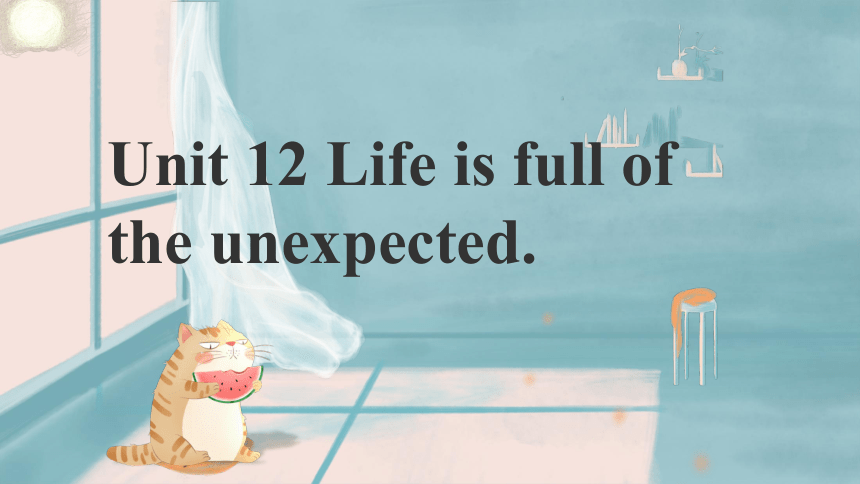
|
|
| 格式 | zip | ||
| 文件大小 | 18.6MB | ||
| 资源类型 | 教案 | ||
| 版本资源 | 人教新目标(Go for it)版 | ||
| 科目 | 英语 | ||
| 更新时间 | 2020-06-19 00:00:00 | ||
图片预览

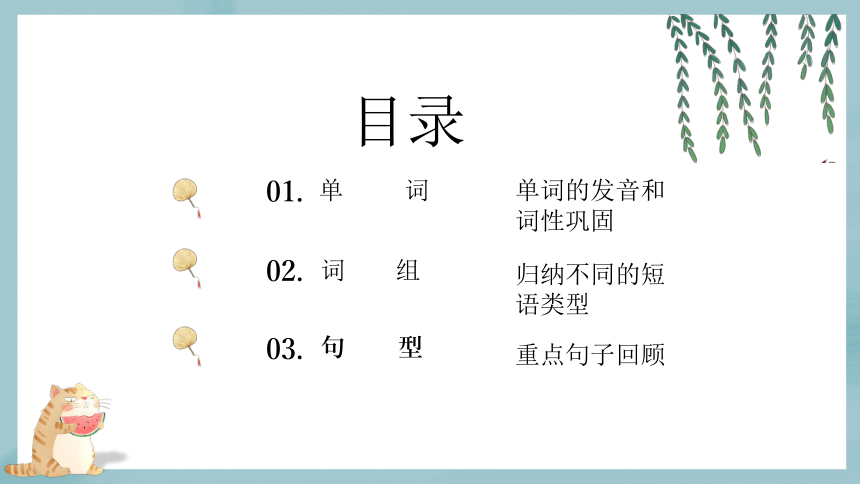

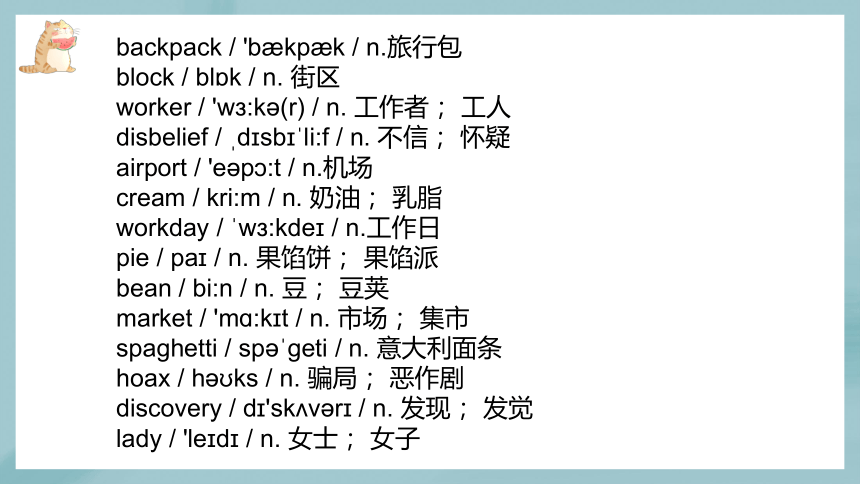
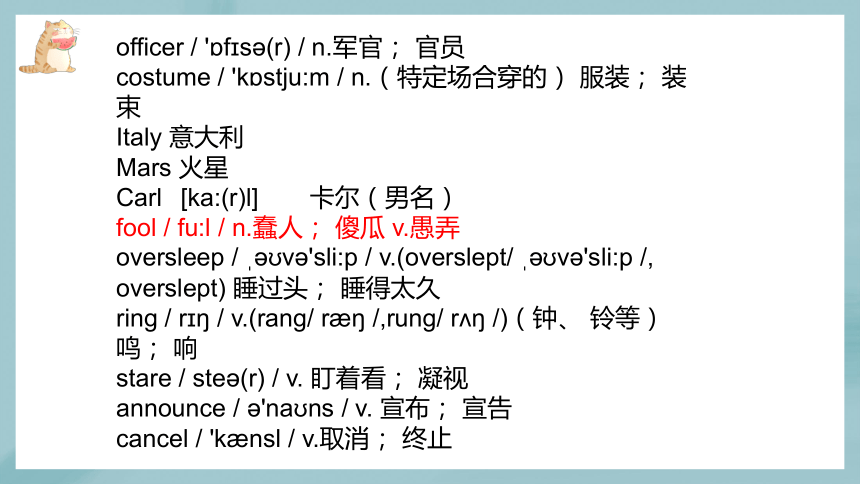
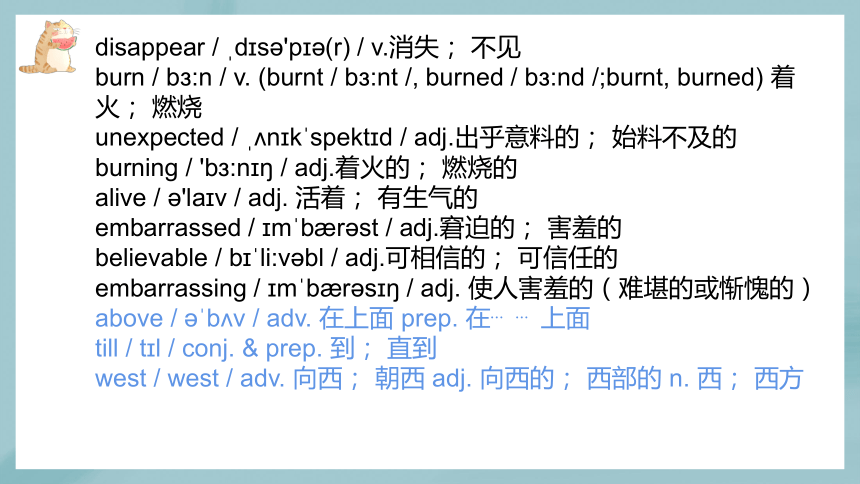

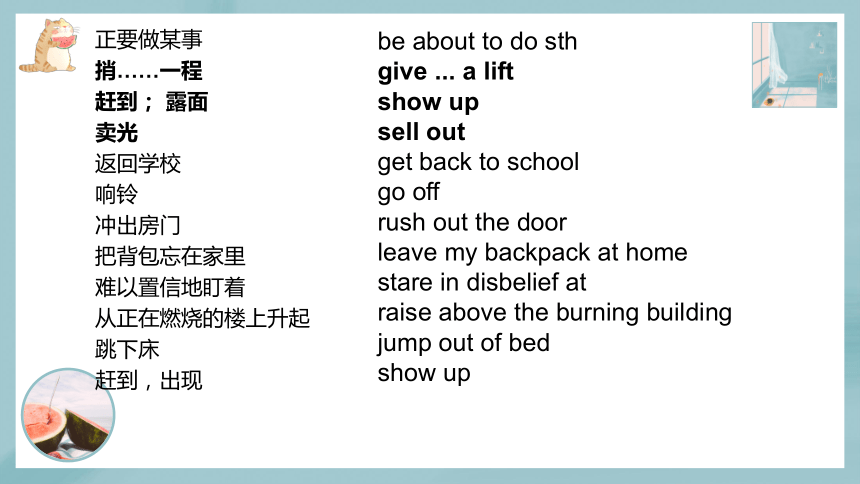
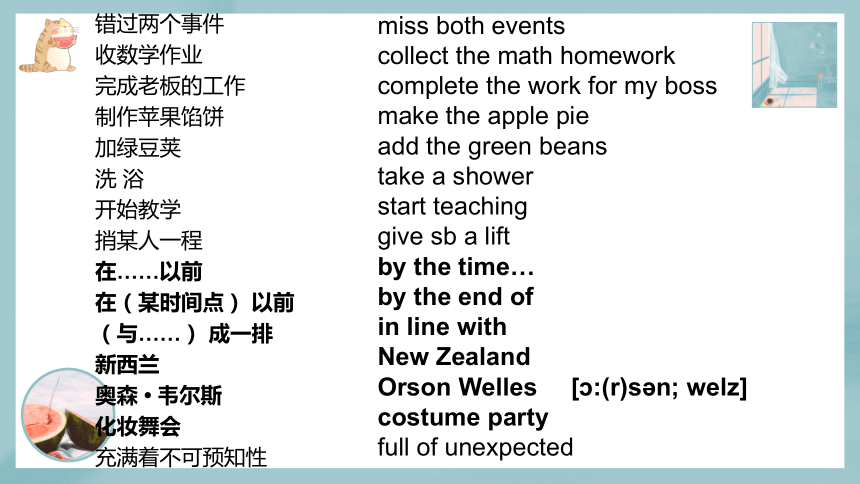
文档简介
(共25张PPT)
Unit
12
Life
is
full
of
the
unexpected.
目录
单词
01.
词组
02.
句型
03.
单词的发音和词性巩固
归纳不同的短语类型
重点句子回顾
单词发音与词性
壹
backpack
/
'b?kp?k
/
n.旅行包
block
/
bl?k
/
n.
街区
worker
/
'w?:k?(r)
/
n.
工作者;
工人
disbelief
/
?d?sb??li:f
/
n.
不信;
怀疑
airport
/
'e?p?:t
/
n.机场
cream
/
kri:m
/
n.
奶油;
乳脂
workday
/
?w?:kde?
/
n.工作日
pie
/
pa?
/
n.
果馅饼;
果馅派
bean
/
bi:n
/
n.
豆;
豆荚
market
/
'mɑ:k?t
/
n.
市场;
集市
spaghetti
/
sp??geti
/
n.
意大利面条
hoax
/
h??ks
/
n.
骗局;
恶作剧
discovery
/
d?'sk?v?r?
/
n.
发现;
发觉
lady
/
'le?d?
/
n.
女士;
女子
officer
/
'?f?s?(r)
/
n.军官;
官员
costume
/
'k?stju:m
/
n.(特定场合穿的)
服装;
装束
Italy
意大利
Mars
火星
Carl
[ka:(r)l]
卡尔(男名)
fool
/
fu:l
/
n.蠢人;
傻瓜
v.愚弄
oversleep
/
???v?'sli:p
/
v.(overslept/
???v?'sli:p
/,
overslept)
睡过头;
睡得太久
ring
/
r??
/
v.(rang/
r??
/,rung/
r??
/)(钟、
铃等)
鸣;
响
stare
/
ste?(r)
/
v.
盯着看;
凝视
announce
/
?'na?ns
/
v.
宣布;
宣告
cancel
/
'k?nsl
/
v.取消;
终止
disappear
/
?d?s?'p??(r)
/
v.消失;
不见
burn
/
b?:n
/
v.
(burnt
/
b?:nt
/,
burned
/
b?:nd
/;burnt,
burned)
着火;
燃烧
unexpected
/
??n?k?spekt?d
/
adj.出乎意料的;
始料不及的
burning
/
'b?:n??
/
adj.着火的;
燃烧的
alive
/
?'la?v
/
adj.
活着;
有生气的
embarrassed
/
?m?b?r?st
/
adj.窘迫的;
害羞的
believable
/
b??li:v?bl
/
adj.可相信的;
可信任的
embarrassing
/
?m?b?r?s??
/
adj.
使人害羞的(难堪的或惭愧的)
above
/
??b?v
/
adv.
在上面
prep.
在??上面
till
/
t?l
/
conj.
&
prep.
到;
直到
west
/
west
/
adv.
向西;
朝西
adj.
向西的;
西部的
n.
西;
西方
词组巩固
贰
正要做某事
捎……一程
赶到;
露面
卖光
返回学校
响铃
冲出房门
把背包忘在家里
难以置信地盯着
从正在燃烧的楼上升起
跳下床
赶到,出现
be
about
to
do
sth
give
...
a
lift
show
up
sell
out
get
back
to
school
go
off
rush
out
the
door
leave
my
backpack
at
home
stare
in
disbelief
at
raise
above
the
burning
building
jump
out
of
bed
show
up
错过两个事件
收数学作业
完成老板的工作
制作苹果馅饼
加绿豆荚
洗
浴
开始教学
捎某人一程
在……以前
在(某时间点)
以前
(与……)
成一排
新西兰
奥森???韦尔斯
化妆舞会
充满着不可预知性
miss
both
events
collect
the
math
homework
complete
the
work
for
my
boss
make
the
apple
pie
add
the
green
beans
take
a
shower
start
teaching
give
sb
a
lift
by
the
time…
by
the
end
of
in
line
with
New
Zealand
Orson
Welles
[?:(r)s?n;
welz]
costume
party
full
of
unexpected
句子巩固
叁
1.当我起床时,我哥哥已经进了浴室了。
By
the
time
I
got
up,
my
brother
had
already
gotten
in
the
shower.
2.当我出来时,公汽已经走了。
By
the
time
I
got
outside,
the
bus
had
already
gone.
3.当我到达学校时,我才意识到我把背包忘在家里了。
When
I
got
to
school,
I
realized
I
had
left
my
backpack
at
home.
4.当我走进教室时,老师已经开始讲课了。
By
the
time
I
walked
into
class,
the
teacher
had
started
teaching
already.
5.当我到达晚会时,
其他的每个人都已经到了。
By
the
time
I
arrived
at
the
party,
everyone
else
had
already
showed
up.
6.当他把面条放进碗里时,他意识到他忘了添加绿豆荚了。
When
he
put
the
noodles
into
the
bowl,
he
realized
he
had
forgotten
to
add
the
green
beans.
7.在她得到一个向他告别的机会之前,他已经进入楼房了。
Before
she
got
a
chance
to
say
goodbye,
he
had
gone
into
the
building.
句子分析:
1.Life
is
full
of
the
unexpected.
be
full
of意为“充满”,相当于be
filled
with。例如:
The
glass
is
full
of
water.=The
glass
is
filled
with
water.
杯子里装满了水。
The
classroom
is
full
of
different
boys
and
girls.
教室里挤满了不同的男孩女孩。
2.
And
by
the
time
I
got
up
,
my
brother
had
already
gotten
in
the
shower.
(1)by
the
time的意思是“到……时间为止”,强调时间的截止,引导时间状语从句。By
the
time+过去的时间,主句一般用过去完成时,表示在从句谓语动作前已经完成。例如:
By
the
time
I
got
there,
the
bus
had
already
left.
不晚于我到那里时,公共汽车已经开走了。
(2)当时间状语为by
the
end
of
last
month/year/week时,主句也用过去完成时。例如:
By
the
end
of
last
month
we
had
learned
20
English
songs.
到上一个月我们已经学习了20首英语歌曲。
(1)过去完成时的概念:
过去完成时表示一个动作或者状态在过去某一个时间或者动作之前已经完成或结束,也可以说是“过去的过去”。它的结构是:had+动词的过去分词,had用于各种人称和数,即had没有人称和数的变化。
(2)过去完成时的否定和疑问句式:
过去完成时的否定句是在had的后面直接加not;过去完成时的一般疑问句是直接把had移到句首。它的肯定回答是:Yes,I
had.
否定回答是:No,
I
hadn’t.
例如:
He
hadn’t
finished
his
homework
before
I
came
back.
在我回来之前,他没有完成作业。
—Had
you
finished
your
homework
by
the
time
your
mother
came
back?
到你妈妈回来的时候,你完成你的家庭作业了吗?
—Yes,I
had.
是的,完成了。
3.
What
happened
to
Dave
on
April
Fool’s
Day?
(1)happen是不及物动词,意思是“发生”,和动词短语takeplace是同义词。它们共同特点是:
都是不及物动词,没有被动语态形式;都是非延续性动词,不能和表示一段时间的状语连用。它们的不同点是:happen是表示偶然性的、出乎意料之外的事情发生;takeplace表示必然性的发生或者计划、策划好的事情发生。例如:
What
happened
to
you
on
the
road
yesterday?
昨天晚上你在路上发生什么事情?
Great
changes
have
taken
place
in
China
since
1978.
自1978年以来中国发生了巨大的变化。
(2)
happen构成的动词短语有:happen
to
somebody
表示“(某事)发生在某人的身上”。happen
to
do
something=do
something
by
accident
表示“偶然做某事”的意思。例如:
An
accident
happened
to
him
after
drinking
too
much.
他喝醉酒之后发生了一场事故。
I
happened
to
meet
your
mother
yesterday.
昨天我偶然遇见你的妈妈。
4.
Welles
made
it
sound
so
real
that
hundreds
of
people
believed
the
story
…
so...that意思是“如此……以至于……”,中间用形容词或者副词,so修饰词形容词或副词,形容词后一般没有名词,that的后面是表示结果的状语从句。而同义短语such...that的中间有名词,such修饰此名词。例如:
Our
teacher
is
so
kind
that
all
of
us
like
him.
我们的老师是如此好心以至于我们都喜欢他。
He
runs
so
fast
that
nobody
in
my
class
can
catch
up
with
him.
他跑得那么快,我们班没有人能追上他。
It
is
such
an
interesting
film
that
all
of
us
like
it.
它是一部如此有兴趣的电影以至于我们都喜欢它。
He
had
such
long
arms
that
he
could
almost
touch
his
knees.
他的胳膊很长,几乎就能够到他的膝盖。
【注意】
如果名词前的形容词是表示数量的few、little、many、much仍要用so修饰。例如:
There
are
so
many
people
in
the
room
that
we
could
not
get
in.
房间里那么多的人,我们都进不去。
【拓展】
so
that意思是“以便于、为了”,引导表示目的的状语从句。例如:
We
got
up
early
this
morning
so
that
we
can
catch
the
first
bus.
我们今天早上起床很早是为了能赶上第一班公共汽车。
5.
As
I
was
waitingin
line
with
other
office
workers,
I
heard…
as是连词,意为“当……时候”,引导时间状语从句,强调两个动作同时发生;或某事发生的过程中另一件事发生;或某事一发生,另一件事立即发生。例如:
We
walked
into
the
garden
as
the
music
stopped.
音乐声一停,我们就走进了花园。
as的用法颇多,现将所学的其他用法归纳如下:
(1)
as作连词:
1)
“像……一样、如……”,常用于比较状语从句或方式状语从句。例如:
I
can’t
run
as
fast
as
I
used
to.
我跑得不如过去那样快。
You
must
do
everything
as
I
do.
你必须按照我做的那样去做每件事。
2)
“因为,既然”,引导原因状语从句。例如:
As
we
are
both
tired,
let’s
stop
to
have
a
rest.
既然我们都累了,让我们停下来休息会吧。
3)
“正如,照……方法”,常引导非限制性定语从句。例如:
As
we
all
know,
the
earth
travels
around
the
sun.
众所周知,地球绕着太阳转。
(2)as作介词,意为“好像;作为、当作”。例如:
I
work
in
Beijing
as
a
guider
我在北京当导游。
本节内容回顾
单词
01.
词组
02.
句型
03.
单词的发音和词性巩固
归纳不同的短语类型
重点句子回顾
Thank
you!
Unit
12
Life
is
full
of
the
unexpected.
目录
单词
01.
词组
02.
句型
03.
单词的发音和词性巩固
归纳不同的短语类型
重点句子回顾
单词发音与词性
壹
backpack
/
'b?kp?k
/
n.旅行包
block
/
bl?k
/
n.
街区
worker
/
'w?:k?(r)
/
n.
工作者;
工人
disbelief
/
?d?sb??li:f
/
n.
不信;
怀疑
airport
/
'e?p?:t
/
n.机场
cream
/
kri:m
/
n.
奶油;
乳脂
workday
/
?w?:kde?
/
n.工作日
pie
/
pa?
/
n.
果馅饼;
果馅派
bean
/
bi:n
/
n.
豆;
豆荚
market
/
'mɑ:k?t
/
n.
市场;
集市
spaghetti
/
sp??geti
/
n.
意大利面条
hoax
/
h??ks
/
n.
骗局;
恶作剧
discovery
/
d?'sk?v?r?
/
n.
发现;
发觉
lady
/
'le?d?
/
n.
女士;
女子
officer
/
'?f?s?(r)
/
n.军官;
官员
costume
/
'k?stju:m
/
n.(特定场合穿的)
服装;
装束
Italy
意大利
Mars
火星
Carl
[ka:(r)l]
卡尔(男名)
fool
/
fu:l
/
n.蠢人;
傻瓜
v.愚弄
oversleep
/
???v?'sli:p
/
v.(overslept/
???v?'sli:p
/,
overslept)
睡过头;
睡得太久
ring
/
r??
/
v.(rang/
r??
/,rung/
r??
/)(钟、
铃等)
鸣;
响
stare
/
ste?(r)
/
v.
盯着看;
凝视
announce
/
?'na?ns
/
v.
宣布;
宣告
cancel
/
'k?nsl
/
v.取消;
终止
disappear
/
?d?s?'p??(r)
/
v.消失;
不见
burn
/
b?:n
/
v.
(burnt
/
b?:nt
/,
burned
/
b?:nd
/;burnt,
burned)
着火;
燃烧
unexpected
/
??n?k?spekt?d
/
adj.出乎意料的;
始料不及的
burning
/
'b?:n??
/
adj.着火的;
燃烧的
alive
/
?'la?v
/
adj.
活着;
有生气的
embarrassed
/
?m?b?r?st
/
adj.窘迫的;
害羞的
believable
/
b??li:v?bl
/
adj.可相信的;
可信任的
embarrassing
/
?m?b?r?s??
/
adj.
使人害羞的(难堪的或惭愧的)
above
/
??b?v
/
adv.
在上面
prep.
在??上面
till
/
t?l
/
conj.
&
prep.
到;
直到
west
/
west
/
adv.
向西;
朝西
adj.
向西的;
西部的
n.
西;
西方
词组巩固
贰
正要做某事
捎……一程
赶到;
露面
卖光
返回学校
响铃
冲出房门
把背包忘在家里
难以置信地盯着
从正在燃烧的楼上升起
跳下床
赶到,出现
be
about
to
do
sth
give
...
a
lift
show
up
sell
out
get
back
to
school
go
off
rush
out
the
door
leave
my
backpack
at
home
stare
in
disbelief
at
raise
above
the
burning
building
jump
out
of
bed
show
up
错过两个事件
收数学作业
完成老板的工作
制作苹果馅饼
加绿豆荚
洗
浴
开始教学
捎某人一程
在……以前
在(某时间点)
以前
(与……)
成一排
新西兰
奥森???韦尔斯
化妆舞会
充满着不可预知性
miss
both
events
collect
the
math
homework
complete
the
work
for
my
boss
make
the
apple
pie
add
the
green
beans
take
a
shower
start
teaching
give
sb
a
lift
by
the
time…
by
the
end
of
in
line
with
New
Zealand
Orson
Welles
[?:(r)s?n;
welz]
costume
party
full
of
unexpected
句子巩固
叁
1.当我起床时,我哥哥已经进了浴室了。
By
the
time
I
got
up,
my
brother
had
already
gotten
in
the
shower.
2.当我出来时,公汽已经走了。
By
the
time
I
got
outside,
the
bus
had
already
gone.
3.当我到达学校时,我才意识到我把背包忘在家里了。
When
I
got
to
school,
I
realized
I
had
left
my
backpack
at
home.
4.当我走进教室时,老师已经开始讲课了。
By
the
time
I
walked
into
class,
the
teacher
had
started
teaching
already.
5.当我到达晚会时,
其他的每个人都已经到了。
By
the
time
I
arrived
at
the
party,
everyone
else
had
already
showed
up.
6.当他把面条放进碗里时,他意识到他忘了添加绿豆荚了。
When
he
put
the
noodles
into
the
bowl,
he
realized
he
had
forgotten
to
add
the
green
beans.
7.在她得到一个向他告别的机会之前,他已经进入楼房了。
Before
she
got
a
chance
to
say
goodbye,
he
had
gone
into
the
building.
句子分析:
1.Life
is
full
of
the
unexpected.
be
full
of意为“充满”,相当于be
filled
with。例如:
The
glass
is
full
of
water.=The
glass
is
filled
with
water.
杯子里装满了水。
The
classroom
is
full
of
different
boys
and
girls.
教室里挤满了不同的男孩女孩。
2.
And
by
the
time
I
got
up
,
my
brother
had
already
gotten
in
the
shower.
(1)by
the
time的意思是“到……时间为止”,强调时间的截止,引导时间状语从句。By
the
time+过去的时间,主句一般用过去完成时,表示在从句谓语动作前已经完成。例如:
By
the
time
I
got
there,
the
bus
had
already
left.
不晚于我到那里时,公共汽车已经开走了。
(2)当时间状语为by
the
end
of
last
month/year/week时,主句也用过去完成时。例如:
By
the
end
of
last
month
we
had
learned
20
English
songs.
到上一个月我们已经学习了20首英语歌曲。
(1)过去完成时的概念:
过去完成时表示一个动作或者状态在过去某一个时间或者动作之前已经完成或结束,也可以说是“过去的过去”。它的结构是:had+动词的过去分词,had用于各种人称和数,即had没有人称和数的变化。
(2)过去完成时的否定和疑问句式:
过去完成时的否定句是在had的后面直接加not;过去完成时的一般疑问句是直接把had移到句首。它的肯定回答是:Yes,I
had.
否定回答是:No,
I
hadn’t.
例如:
He
hadn’t
finished
his
homework
before
I
came
back.
在我回来之前,他没有完成作业。
—Had
you
finished
your
homework
by
the
time
your
mother
came
back?
到你妈妈回来的时候,你完成你的家庭作业了吗?
—Yes,I
had.
是的,完成了。
3.
What
happened
to
Dave
on
April
Fool’s
Day?
(1)happen是不及物动词,意思是“发生”,和动词短语takeplace是同义词。它们共同特点是:
都是不及物动词,没有被动语态形式;都是非延续性动词,不能和表示一段时间的状语连用。它们的不同点是:happen是表示偶然性的、出乎意料之外的事情发生;takeplace表示必然性的发生或者计划、策划好的事情发生。例如:
What
happened
to
you
on
the
road
yesterday?
昨天晚上你在路上发生什么事情?
Great
changes
have
taken
place
in
China
since
1978.
自1978年以来中国发生了巨大的变化。
(2)
happen构成的动词短语有:happen
to
somebody
表示“(某事)发生在某人的身上”。happen
to
do
something=do
something
by
accident
表示“偶然做某事”的意思。例如:
An
accident
happened
to
him
after
drinking
too
much.
他喝醉酒之后发生了一场事故。
I
happened
to
meet
your
mother
yesterday.
昨天我偶然遇见你的妈妈。
4.
Welles
made
it
sound
so
real
that
hundreds
of
people
believed
the
story
…
so...that意思是“如此……以至于……”,中间用形容词或者副词,so修饰词形容词或副词,形容词后一般没有名词,that的后面是表示结果的状语从句。而同义短语such...that的中间有名词,such修饰此名词。例如:
Our
teacher
is
so
kind
that
all
of
us
like
him.
我们的老师是如此好心以至于我们都喜欢他。
He
runs
so
fast
that
nobody
in
my
class
can
catch
up
with
him.
他跑得那么快,我们班没有人能追上他。
It
is
such
an
interesting
film
that
all
of
us
like
it.
它是一部如此有兴趣的电影以至于我们都喜欢它。
He
had
such
long
arms
that
he
could
almost
touch
his
knees.
他的胳膊很长,几乎就能够到他的膝盖。
【注意】
如果名词前的形容词是表示数量的few、little、many、much仍要用so修饰。例如:
There
are
so
many
people
in
the
room
that
we
could
not
get
in.
房间里那么多的人,我们都进不去。
【拓展】
so
that意思是“以便于、为了”,引导表示目的的状语从句。例如:
We
got
up
early
this
morning
so
that
we
can
catch
the
first
bus.
我们今天早上起床很早是为了能赶上第一班公共汽车。
5.
As
I
was
waitingin
line
with
other
office
workers,
I
heard…
as是连词,意为“当……时候”,引导时间状语从句,强调两个动作同时发生;或某事发生的过程中另一件事发生;或某事一发生,另一件事立即发生。例如:
We
walked
into
the
garden
as
the
music
stopped.
音乐声一停,我们就走进了花园。
as的用法颇多,现将所学的其他用法归纳如下:
(1)
as作连词:
1)
“像……一样、如……”,常用于比较状语从句或方式状语从句。例如:
I
can’t
run
as
fast
as
I
used
to.
我跑得不如过去那样快。
You
must
do
everything
as
I
do.
你必须按照我做的那样去做每件事。
2)
“因为,既然”,引导原因状语从句。例如:
As
we
are
both
tired,
let’s
stop
to
have
a
rest.
既然我们都累了,让我们停下来休息会吧。
3)
“正如,照……方法”,常引导非限制性定语从句。例如:
As
we
all
know,
the
earth
travels
around
the
sun.
众所周知,地球绕着太阳转。
(2)as作介词,意为“好像;作为、当作”。例如:
I
work
in
Beijing
as
a
guider
我在北京当导游。
本节内容回顾
单词
01.
词组
02.
句型
03.
单词的发音和词性巩固
归纳不同的短语类型
重点句子回顾
Thank
you!
同课章节目录
- Unit 1 How can we become good learners.
- Section A
- Section B
- Unit 2 I think that mooncakes are delicious!
- Section A
- Section B
- Unit 3 Could you please tell me where the restroom
- Section A
- Section B
- Unit 4 I used to be afraid of the dark.
- Section A
- Section B
- Unit 5 What are the shirts made of?
- Section A
- Section B
- Review of Units 1-5
- Unit 6 When was it invented?
- Section A
- Section B
- Unit 7 Teenagers should be allowed to choose their
- Section A
- Section B
- Unit 8 It must belong to Carla.
- Section A
- Section B
- Unit 9 I like music that I can dance to.
- Section A
- Section B
- Unit 10 You're supposed to shake hands.
- Section A
- Section B
- Review of Units 6-10
- Unit 11 Sad movies make me cry.
- Section A
- Section B
- Unit 12 Life is full of the unexpected
- Section A
- Section B
- Unit 13 We're trying to save the earth!
- Section A
- Section B
- Unit 14 I remember meeting all of you in Grade 7.
- Section A
- Section B
- Review of Units 11-14
